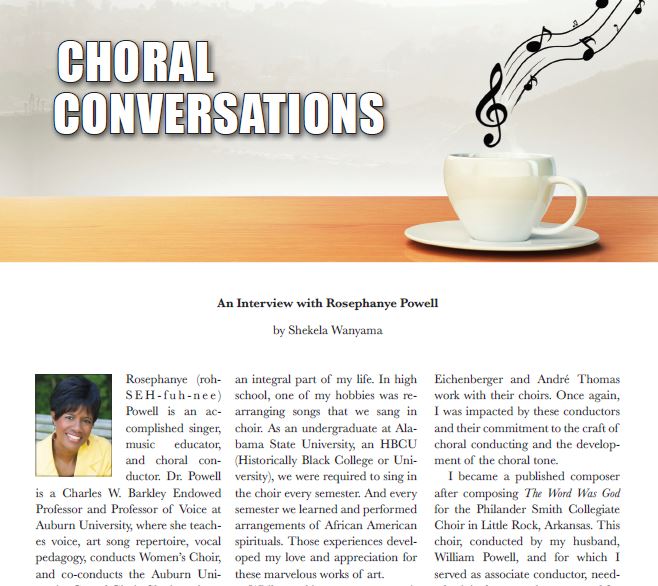
_____________________________
Choral Journal’s ongoing column called Choral Conversations” features interviews with noted choral conductors and composers. The seventh interview in this series took place with Rosephanye Powell in the March 2020 issue.
You can read the interview in its entirety online at acda.org/choraljournal. Click “Search Archives” and choose March 2020 from the dropdown menu.
_____________________________
What is more important to you: the text or the music?
In one sense, I consider the text to be of primary importance since the text is the message to be communicated. In another sense, the music is of equal importance with the text. In addition to providing harmonic support, the music plays an equal role with the text in communicating the message and meaning of the text. I begin composition by immersing myself in the text, repeating and memorizing the text in addition to reading about the poet.
Through this immersion, the music begins to develop as I seek to express the sentiment and heart of the message awakened in me. The rhythm of the poetry influences the rhythm of the melody and the shape of the vocal line. The mood and energy experienced as I recite the poetry determine the text setting, tempo, form, rhythms, and harmonies. In contrast to the spoken word alone, music can serve to enhance the meaning of the text, painting mental pictures of it for the performer and listener. At the same time, music can detract from and betray the meaning of the text if its marriage to the poetry is not given serious consideration in composition.
What advice do you give composers who are entering the field today?
The advice I off er is to strive to develop one’s craft and distinct voice compositionally. The development of a career in composition is one that requires patience and persistence. I caution composers not to compose for the sake of composing. Rather, compose because one has a message to share or a story to tell through music. Then, people “get it” and connect to it. From lessons learned while a young composer, I inform composers to submit to one publisher at a time and wait several months before submitting to another. They should be sure to get a poet’s permission before setting their poem to music.
Also, when arranging someone else’s music, composers should be sure to obtain permission from the composer to do so. Finally, if one is having difficulty being accepted by an established publisher, consider self-publishing through one’s own website. Or, consider working with a non-traditional publisher who will allow the composer to keep ownership while providing online exposure and distribution for a fee or a small percentage of the sales.
_____________________________
Read the rest of this interview (and more!) in the March 2020 issue of Choral Journal.


Leave a Reply
You must be logged in to post a comment.